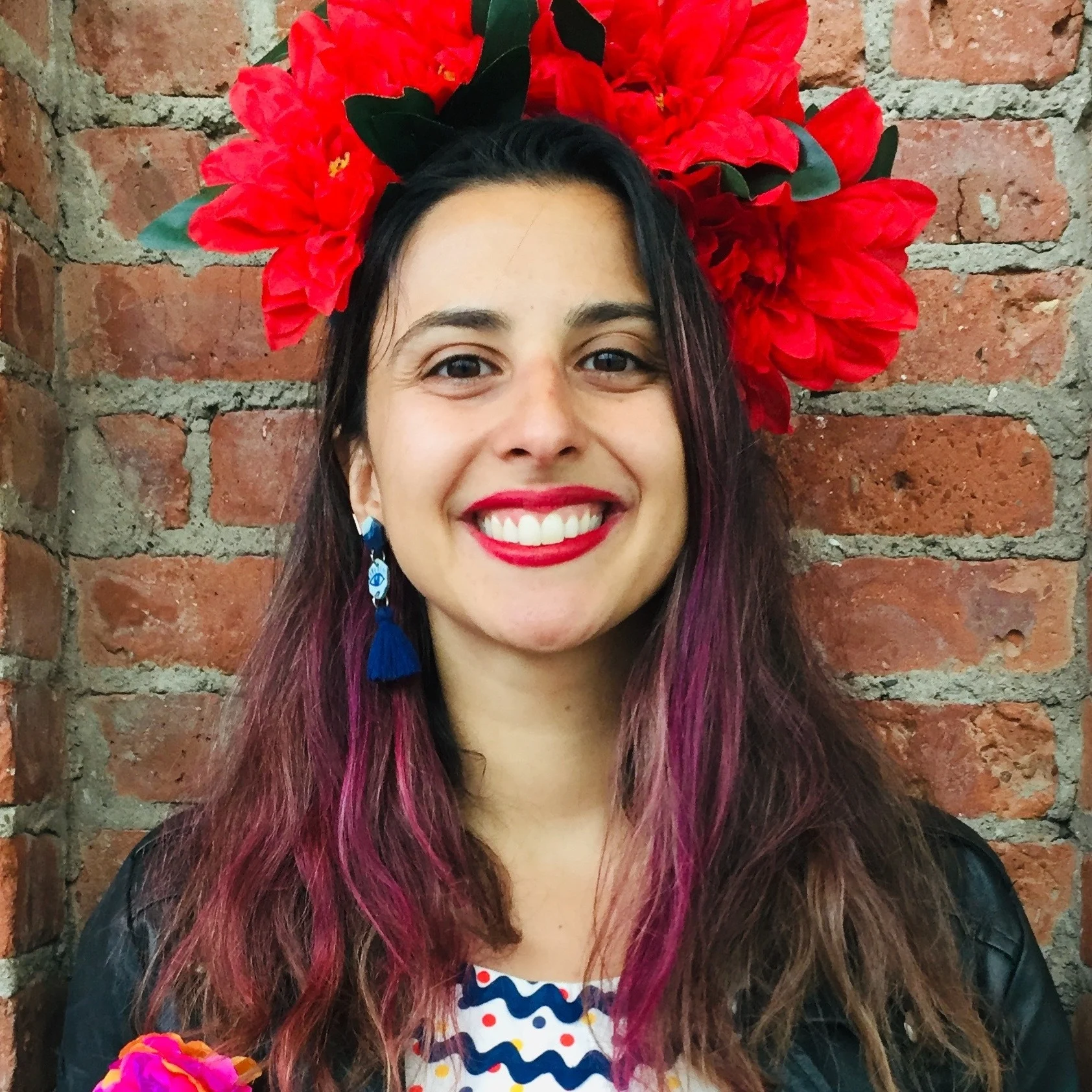Stay in the know
All our latest podcasts delivered right to your inbox.
Not many people are aware of nonverbal learning disabilities (NVLD). Fewer still know the challenges of finding a job when you have NVLD.
Michaela Hearst, who has NVLD, shares her career journey — how she decided to be a school counselor so she could support students with learning differences. She describes tools and strategies she’s learned over the years, and how she teaches them to kids. And she talks about how a social work degree can lead to different career paths.
Listen in. Then:
Episode transcript
Eleni: From the Understood Podcast Network, this is "How'd You Get THAT Job?!," a podcast that explores the unique and often unexpected career paths of people with learning and thinking differences. My name is Eleni Matheou, and I'm a user researcher here at Understood. That means I spend a lot of time thinking about how we find jobs we love that reflect how we learn and who we are. I'll be your host.
So our next guest is someone with a really unique story. Michaela Hearst is a school counselor in Vermont who works with middle and high school students. She has nonverbal learning disabilities and is going to share with us how her learning differences led her to her current job. Welcome, Michaela.
Michaela: Hi, everyone. I'm Michaela Hearst. Thank you for that introduction. You took a lot of words right out of my mouth. It's been a very interesting journey that led me here.
Eleni: Michaela, can you just give me a little quick summary of, you know, what you're doing right now?
Michaela: My full title is student assistance professional counselor, or SAP, SAP counselor, or even counselor, that's fine. I serve as a resource in school for promoting mental health — super important — and substance misuse prevention, also super important. And I like tying in prevention education, which goes — of course you need that when you work in a high school, in a middle school. But I like tying that in with what it's like to be neurodivergent and the correlation between academic and social struggles and wanting to turn to substances. So that's one of the things that, going forward, I'm going to be focusing on.
Eleni: We've actually never had anyone on the show with a nonverbal learning disability.
Michaela: So, a first for everything.
Eleni: Yeah. Could you like describe a little bit about what your challenges are and what that means for our audience?
Michaela: You know, it's funny. I used to be asked that question and I used to know right off the bat. Just after a lot of self-searching and a lot of therapeutic processes, the answer isn't so clear cut anymore. But I think ultimately my struggles most of all are visual, spatial relations, depth perception, processing speed. And I have a lot of trouble self-starting, organization.
Eleni: So you just shared that it can impact you spatially and things like that. Like what does that look like day to day?
Michaela: Driving was something that I needed to work on for a long time. My relationship with driving is complicated in part because I was hit by a car. And obviously I survived and I was very, very, very lucky that day. But when the accident happened, it left me very apprehensive to drive for a very long time. And I was just crossing the street. I wasn't driving at the time. But, you know, driving requires a lot of visual, spatial awareness and depth perception. And I have my own car and I drive to work every day. And even when it terrifies me, I'm still like not there yet. It still scares me. But the only way I think I'm going to really push through it is the exposure therapy. If I just keep going and I feel a little bit better each time, which is good, this is good. So that's just one example of how I've made something work for me.
Eleni: And you said that you're constantly learning about yourself, and there's been things that have surprised you or that you've only recently made the connection that it's related to your difference. Can you think of any recent examples of something that you've learnt about yourself?
Michaela: Yeah, I've learned that some challenges just don't go away as much as that would be, you know, in an ideal world. But fact of the matter is my brain is wired differently and the way I speak, I go off on tangents. Sometimes I think faster than I can talk or I talk faster than I can think. And it's part of who I am and I'm still working on accepting that.
Eleni: I know you've done a little bit of writing for Understood. We've done a number of blogs, and I read that in one of your blogs that you have really strong memory. Do you want to talk a little bit about that and any other strengths that you can think of that relate to, you know, your learning disability?
Michaela: Yeah, I have a very, very, very strong memory. I remember things that most people with a neurotypical brain wouldn't. And that comes as both a blessing and a curse is I remember everything. So my joke is like, people have to watch what they say to me because I'm going to hold on to that forever. My brain will hold on to it. But again, it's both a blessing and a curse. People will come to me if they need help remembering some random thing that happened in fourth grade on a Tuesday. And my brain will just pick that up. And things that most of my classmates that I keep in touch with don't remember, but that's OK.
Eleni: How did the memories come up for you? Is it like a visual memory? You know how people talk about memories being attached to like smells or like photographic memory and things like that. Like, what does it appear like for you?
Michaela: There are times where everything is just so vivid and it feels like I'm back there again. You know, I remember the feel of my elementary school desks. I remember the way that the chairs felt when I had to sit in them for hours. I remember snack time being at 9:30 and my staring at the clock. I remember the songs that were stuck in my head because I was allowed to listen to my CD player on the bus. You know, I can immediately think, oh, fifth grade, and all those things will just come to my brain. I remember where I sat that entire year. I remember where I sat every single year, starting from first grade because that's when we had desks. So believe me when I say when I remember everything, I remember everything.
Eleni: Yeah, I think it's so interesting that you say that after a lot of reflection and therapy, it kind of redefined what it means to you. Was there a particular moment where that shift happened or when you really learnt something about yourself?
Michaela: Yeah, some of it, or most of it actually, was during COVID when I was trying to find a job and thinking about what I really wanted to do and how social work was still relevant to that. But I knew that I wanted a broader scope of ways to work with students. A lot of the introspection came from, if I was going to start working, I needed to consider a lot of things.
I needed to get to know myself a little bit better and to come to terms with my challenges. Because in the past, I didn't always come to terms with what I really struggled with. And it took me a very long time to really open up about some of the things that I've been dealing with for years.
Eleni: So we've talked a little bit about your nonverbal learning disabilities, or NVLDs. Let's transition a bit and talk about your job and your career. How did you decide to become a school counselor? And how did you decide to focus on learning differences? Where did it all start?
Michaela: I knew from a youngish age that I wanted to be a psychologist. I used to, even in middle school, I used to go around saying that I was going to make people pay money to see my face and listen to me talk for an hour and give them advice, because that sounded really easy, right? No, it's not. But you know, that little running joke stuck with me all of those years.
And I ended up majoring in psychology in college, and I took some time off to get my certificate, because I knew that I wanted to work with students with learning disabilities. I knew that I wanted to be in that field. I just wasn't sure what capacity yet. And then I thought about social work. And it felt like it would give me a whole wide range of opportunities that I might not necessarily get had I majored — gone for my master's in psychology. And I knew I wanted to provide students with support — and some support that I didn't necessarily receive.
Eleni: Yeah. I was going to say, so you feel like you want to be that person that you didn't really have.
Michaela: And I am that person in my school. I have students show up at my office all the time with different needs. And sometimes they just want to hang out. Sometimes they want to tell me something good that happened in their life. And I love that.
Eleni: I'm glad that you can be there for them.
Michaela: Yeah, me too. I definitely love it. It's challenging, but I'm doing what I love, and it's all I can really ask for, I think.
Eleni: So you will making the distinction between social work and psychology. Do you want to talk a little bit about how you came to discover that distinction and then also figure out like what your niche would be and why working in a school might be the best fit for you?
Michaela: I always knew that I wanted to work with students, even from the beginning of college. I knew that I wanted to work in the learning disabilities field. And then as time went on, I was like, I can see myself working in a school because I knew I wanted to be working with students. I kind of saw myself being a school social worker, but I knew that social work would have helped me find my way in terms of what I wanted to do and social work really combined the aspect of social justice, which I love, and the psychological aspect. And social workers, there's a lot of stigma and stereotypes about social workers and what we do. And those stereotypes are not true. We don't knock on doors and take away people's kids. That's not what we do.
Social workers do a lot of things. And in my case, that means I wear different hats, right. I'm still an LMSW. I'm a licensed master social worker. But I combine that with my graduate certificate in learning disabilities, all my skills together, and everything I wanted to be doing as a student assistance professional.
Eleni: Yeah. It's pretty cool that you are able to combine your interests in that way to like find the perfect role for you that fits in with both your interests and like your qualifications. What would you say is the biggest overlap between those two hats?
Michaela: I mean, one of them is, like I said, the social justice aspect, knowing how to sit and counsel students and knowing how to complete referrals and make connections when need be. And then the other side of that is the educational component is my certificate in learning disabilities. And also my lived experience. So I have a dual background in education and social work, and what I'm doing now really combines the two in my very strong, but humble opinion.
Eleni: I mean, that's what this show is about. It's about showcasing your strengths. I just want to go back to something you said earlier. So you said in school, you weren't necessarily getting the support that you needed or wanted. Do you want to talk a little bit about when you found out you had a nonverbal learning disability and how that showed up for you at school — and maybe even the kind of support that you would have liked that you're now reflecting back, thinking that you never really got at the time?
Michaela: Yeah, this is always a heavy one, but I was diagnosed when I was 14. And yeah, it's a little late in the game, and I struggled for years before that, but my struggles weren't as clear cut. I was having a hard time with tests and getting my homework done by myself. But to be fair, I had a lot of homework and that never should have happened.
I just really struggled, and my struggles only got worse until high school when I was failing my classes. And before I had just failed tests, I had never actually failed a class. So my parents were like, we want answers. And so I got diagnosed. And it provided us with a lot of answers, but at the same time, it was like, this is hard. This is really rough.
Eleni: And it sounds like from there you were eventually able to go to college and get your degrees. What do you think helped you get to that place?
Michaela: Well, I went to a school called Landmark College. It's for students with learning disabilities, and they just taught me so much. And I learned so many study strategies and writing strategies. And for the first time, I genuinely felt smart. Or I had that foundation to know how to feel smart. I just knew how to help myself, and that didn't stop with Landmark, but I'm still learning how to help myself. I'm still learning what I need. And you know, that goes back to what I said earlier about finding myself. It's a process and it didn't end with Landmark and it isn't ending with my work now. It's only beginning.
Eleni: So you mentioned that you were able to apply like some of the things that you learned at Landmark later in life. How did that help you through your studies and even now in the work that you do?
Michaela: I like to pass the things I learned on to my students, but I think of what was done with me at Landmark was I would go to a place called the Drake Center for Academic Support. You can go and make an appointment with a teacher or a tutor there, and they'll say, OK, what are you working on? And you can work on an essay or study strategies. And one of the things that Landmark did with me is working on learning how to read documents and saying, OK, what did I just read? What did I just learn? And that's one of the things that I do with my students.
Eleni: It sounds like you're pretty open about your differences at work. Is it just with the kids, or is it also with your colleagues?
Michaela: Kind of both. I've disclosed that part of why I am where I am in life now is my struggles have led me to my strengths and made me want to make a difference. And with my students, I'll say some things like, you know, if they tell me "I have dyslexia," "I have ADHD." And I said, "I get it. I have a learning disability myself." And some of them will look at me with these wide eyes. Like somebody gets it. And I said, "Where I am in life right now, like this did not happen overnight. But if I can get here, you can get here too. I'm just here to help you do that."
Eleni: I hear that in my research a lot from people when they're reflecting back as adults, thinking about who made an impact in their lives. And it is often a teacher that shares, oh, I have ADHD too. I have dyslexia too. And just feeling like you're not alone and you can always see an adult who's successful, has a job, doing pretty good, can make a really big difference for a young person, definitely.
Michaela: For sure. And I want to be that person. I went into this wanting to be that person.
Eleni: So what do you find challenging about your job?
Michaela: One of the things I find challenging is the burnout level. Because everybody is very tired right now. And I also wear another hat in supporting students and staff mental health. And I always want to make sure my students are staying on track. And that's why I set up weekly counseling meetings or check-in meetings with them. But I'm also here for staff and you really, you see things from the other perspective, when I was a student for so many years and I never knew what it was like to be a faculty member. Now I do. And I see that from both ends.
And then another challenging part of it is, of course, when you work in a school, you deal with some challenging family systems and you have some behaviors that are rough to deal with. But I think the way that I deal with that for the most part is doing my own self-care and remembering that if a kid is acting out, it's, you know, coming from a place of pain and struggle. And my school's mentality is every student, every day, whatever it takes, we want to get to every student. And part of my job is to help keep up that motivation and morale.
Eleni: So how do learning differences impact you at work? What challenges come with your learning disability?
Michaela: I don't face LD-related challenges on the job so much as I know what I need to do to process information. So it's like, I tell students, if I have my notebook, don't worry about it. This is just how I process and remember information. And they're like, OK. None of them are really fazed by it, I don't think. My notebook is, especially when I'm working with students for the first time, I will write their name down, who their advisor is, some of the things that they tell me. But I also don't write down too much because I don't want to seem like I'm too intense. I also want it to be like, we're having a conversation. And I take my notebook to all of my meetings, and I just write things down and — I do calligraphy. And at this point I'm pretty proud of my handwriting overall, when it doesn't look like chicken scratch, it actually looks really nice.
So I take my notebook and I'm able to refer to it. And it's how I stay organized. In some ways I'm kind of old school when it comes to staying organized. I liked my notebook instead of having everything in a million places on my phone.
Eleni: So you just kind of communicate what helps you. And like, I know you said you didn't really feel supported at school. Like, do you feel a little bit more supported now at work?
Michaela: Yeah. I work with such an amazing team. I told them I was doing this podcast. So shout-out to everyone I work with. You guys are awesome. Everyone at Twin Valley. Yeah, I just, I worked with an amazing team, and I have really found my niche working with teenagers and it works. It works with who I am as a person, with my sense of humor, with all of my skills. I just, I like that age group a lot.
And it probably has something to do with the fact that I was diagnosed in high school, and high school in general just sucks for a lot of people. So if I can be the person that makes it kind of suck not as much — lack of a better way to say it — I think that's pretty cool. I got into this line of work because I was a kid growing up with an undiagnosed learning disability. So most of my students know I have a learning disability, or I say I'm neurodivergent. And a lot of my students are neurodivergent too. So I will mention briefly every so often that I'm here because of that struggle. That struggle led me to my strength. So when I get questions about what I do, I talk about being neurodivergent, having that lead me here, and then wanting to be that person that people can trust and open up to and be listened by.
Eleni: It sounds like your own personal experiences make you really good at your job.
Michaela: I have lived experience and the students are really able to relate to me, and they're drawn to me because of not just my age, but who I am as a person. And I've had students come in my office who have learning disabilities, who have dyslexia, who have ADHD. And this is hard to describe over a podcast, but I've said this to my colleagues and I've said it to some of my students. It's like, you're right here. You're right on one side. And on the other side is your full potential or the person that we can get you to be, not even just your full potential, because we don't know what your full potential is. But there's another place that we can get you. And we have to help build that bridge, connect those two places. If we can help build that bridge and help you cross it, that's part of my job.
Eleni: Do you have any advice for anyone with a learning disability or difference that is looking for a job or a career and like maybe they have similar challenges to you?
Michaela: Yeah. My advice or just something to remind you of is that your voice matters. You matter. I have students come in my office and I tell them that when you're in this room with me, or whenever, really, you matter. And I'm always going to tell you that you matter. And my job is to validate you and to listen to you and to hear you. And some of them have never heard that before.
So what I want to say to people like me or to anybody: You matter, and you deserve to be heard and validated for your struggles. And some people are never going to get it because they're not in our shoes, but I get it. I get it. And I hear you and I see you and you're valid.
I understand the challenges and the struggle, and I'm going to keep fighting. I'm going to keep doing what I love doing and hopefully make this world a little bit better than what it is now.
Eleni: Yeah, I hope so. I think that it sounds like you are really making a difference for those students. Thanks so much for coming on.
This has been "How'd You Get THAT Job?!," a part of the Understood Podcast Network. You can listen and subscribe to "How'd You Get THAT Job?!" on Apple, Spotify, or wherever you get your podcasts. And if you like what you heard today, tell someone about it. "How'd You Get THAT Job?!" is for you. So we want to make sure you're getting what you need. Go to u.org/thatjob to share your thoughts and to find resources from every episode. That's the letter U, as in Understood, dot O R G, slash that job.
Do you have a learning difference and a job you're passionate about? Email us at thatjob@understood.org. If you'd like to tell us how you got THAT job, we'd love to hear from you. As a nonprofit and social impact organization, Understood relies on the help of listeners like you to create podcasts like this one, to reach and support more people in more places. We have an ambitious mission to shape the world for difference, and we welcome you to join us in achieving our goals. Learn more at understood.org/mission. "How'd You Get THAT Job?!" is produced by Andrew Lee and Justin D. Wright, who also wrote our theme song. Laura Key is our editorial director at Understood. Scott Cocchiere is our creative director. Seth Melnick and Briana Berry are our production directors. Thanks again for listening.
Host
Eleni Matheou
leads user research for Understood. She helps Understood to center its work on the lived experiences and voices of people who learn and think differently.
Latest episodes
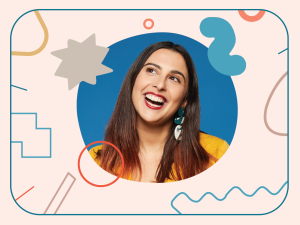
June 28, 2023
In the series finale of How’d You Get THAT Job?!, host Eleni Matheou unpacks what we’ve learned about how people thrive at work.

June 14, 2023
Nathan Friedman is the co-president and chief marketing officer of Understood.org. And he has dyslexia and ADHD. Learn how he got into the C-suite.
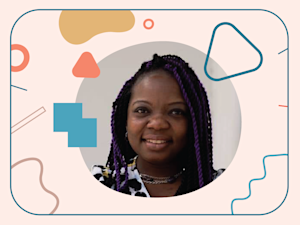
May 31, 2023
Dr. Loucresie Rupert is a child, adolescent, and adult psychiatrist with ADHD. She didn’t have an easy time getting her diagnosis as a Black woman.
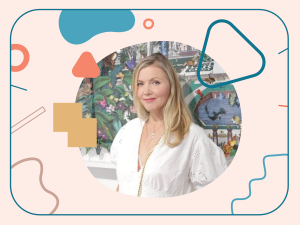
May 17, 2023
Kristjana Williams is a London-based Icelandic artist with dyslexia. She wasn’t diagnosed until she was 25, and now she has her own studio.

May 3, 2023
Aideé Chávez Frescas has ADHD, and is a senior social media manager at Understood. Her posts help end stigma and show others they’re not alone.
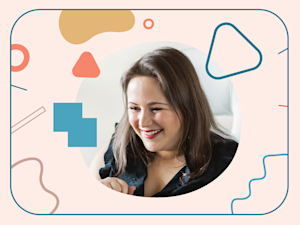
April 19, 2023
Alex Gilbert is a career coach with ADHD and dyslexia. After working in leadership development for years, she started her own coaching business.
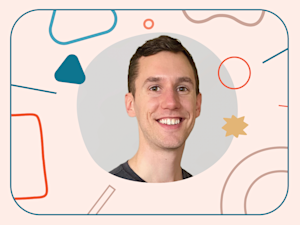
April 5, 2023
Dan Reis was diagnosed with ADHD during the pandemic. Now, he’s made it his mission to explore coping strategies to help him get his work done.
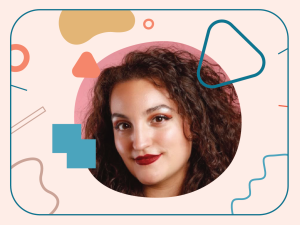
March 22, 2023
Rachel Basoco’s two jobs keep things interesting for her ADHD. She works full time at Fidelity, and part time at 11:11 Media, Paris Hilton’s company.
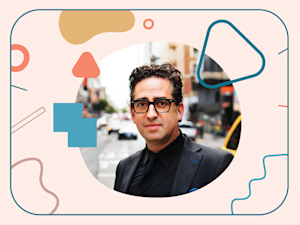
March 8, 2023
Gil Gershoni says that everything he does is dyslexic. He founded the branding firm Gershoni Creative and hosts the Dyslexic Design Thinking podcast.
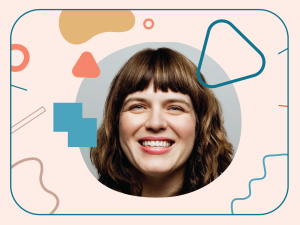
February 22, 2023
Claire Odom is a psychotherapist with ADHD. She’s also a disability inclusion consultant who has advice on navigating the workplace.

